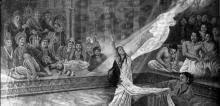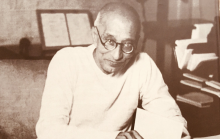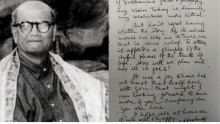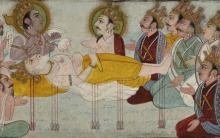Dharmarāja offered tarpaṇa to Bhīṣma and as he neared the shores of Ganga, he collapsed out of sorrow. Dhṛtarāṣṭra, Kṛṣṇa, Vyāsa and everyone else present there consoled him and got him back to his senses. Dhṛtarāṣṭra said – “Get up, Yudhiṣṭhira! Take care of the things that you need to hereafter. Rule the kingdom that you have won over as per the dharma of the Kṣatriyas! It is only Gāndhārī and I who will need to lament at this juncture. The hundred children that she gave birth to have only become objects of a fantastical dream.
Author:hari
There is another variety of poetic challenges in which every foot of a verse is composed by a different poet. The one who composes the first line has the responsibility to provide enough room for other poets to develop on the idea. Metrical feet should ideally grow in complexity and culminate in the fourth line. Doubtless, all four lines should be self-complete, and the verse, taken as a whole, should appear as a single unit. We provide a couple of examples of this type taken from Bhoja-prabandha.
ಸಭಾಪರ್ವದಲ್ಲಿ ದ್ರೌಪದಿ ಅನುಭವಿಸುವ ಅಪಮಾನ ಮನಃಕ್ಲೇಶಗಳು ಮಹಾಭಾರತದ ನಿರ್ದಿಷ್ಟ ಕಾಲಘಟ್ಟದಲ್ಲಿ, ಸಾಮಾನ್ಯ ಮಹಿಳೆಯರು ಅನುಭವಿಸಿರಬಹುದಾದ ದಾರುಣ ಪರಿಸ್ಥಿತಿಯನ್ನು ನಾವು ಊಹಿಸುವಂತೆ ಮಾಡುತ್ತವೆ. ದ್ರೌಪದಿ ಪಾಂಡವರಂತಹ ಮಹಾವೀರರನ್ನು ಗಂಡಂದಿರನ್ನಾಗಿ ಪಡೆದಿದ್ದು, ಅರಮನೆಯಲ್ಲಿ ವಾಸಿಸುತ್ತಿದ್ದ ಮಹಾರಾಣಿ. ಅಂತಹ ಹೆಣ್ಣನ್ನು, ಅದೂ ಅಗ್ನಿಕನ್ಯೆ ಎಂದು ಪ್ರಸಿದ್ಧಳಾಗಿದ್ದವಳನ್ನು ತುಂಬಿದ ರಾಜ ಸಭೆಗೆ ಎಳೆದುತಂದು ವಸ್ತ್ರಾಪಹರಣದ ತನಕ ಹೋದರೆಂದರೆ, ಇದೆಂಥ ಶಿಷ್ಟ ಸಮಾಜ? ಅಪಮಾನ ಮಾಡಿದವರು, ಶಸ್ತ್ರಾಸ್ತ್ರಗಳು, ಶಾಸ್ತ್ರಗಳು ಮುಂತಾದ ಸಕಲ ವಿದ್ಯೆಗಳಲ್ಲಿಯೂ ಪರಿಣತರಾಗಿದ್ದು, ನಾಗರೀಕಸಮಾಜದ ಪ್ರತಿನಿಧಿಗಳಾಗಿದ್ದ ಅರಸುಗಳು.
Rajaji’s words of advice
தண்டம்-கோல்[1]
ஆசாரியர் மாணவனுக்கு தண்டத்தை(கோலை) வழங்கும்போது, அவன், "எனது தண்டம் கீழே விழுந்துவிட்டது, அதனை நான் எனக்கு நீண்ட ஆயுள் கிட்ட வேண்டியும், பிரம்மசரிய மார்க்கத்தில் என்னை வழிநடத்தவும், எனது மாணவ-வாழ்க்கையின் துவக்கத்தைக் குறிக்கவும் மீண்டும் என் கையில் எடுத்திருக்கிறேன்", என்று கூறி தண்டத்தைப் பெற்றுக் கொள்கிறான்.[2] உடல், மனம், வாக்கு இவைகளின் கட்டுப்பாட்டை 'தண்டம்' உணர்த்துகிறது.
Yudhiṣṭhira said, “However competent one might be, if destiny doesn’t smile on him, he will not earn any wealth. Even a helpless chap or a child, if favoured by fortune, earns a great deal of wealth. There are hundreds of people who have gained nothing even after great attempts and tribulations; there are also several people who have become wealthy without even trying.
The following two verses are solutions to a single challenge that posits Viṣṇu is Śiva:
कपाली च कलापी च शिरसा भाति योऽवतात्।
स देहार्धसमासक्तकेशवश्चन्द्रशेखरः॥ (Shankar Rajaraman)
May Śiva who wears a skull as his crest-jewel and Kṛṣṇa who wears peacock feather in his diadem protect us in the form of Hari-hara. In this undivided manner, Viṣṇu is indeed Candra-śekhara.
Sixty-seventy years ago, the erudite scholars of the era were blessed with an abundant vocabulary. Unfortunately, the themes on which this prowess was to be applied were not extraordinary. Shri. Tiruvengadayya of Mulbagal was a scholar in Telugu. He was an expert and an enthusiast when it comes to teaching classical poetry; pure in conduct; a true devotee of the Almighty. He was the headmaster of the Telugu middle school.
My Suggestions
Once, there was a certain shortcoming in the functioning of the Servants of India Society. Sastri was the head of the organization. The English weekly “Servants of India” which was run by the society was lacking in funds. It was my desire to somehow keep the magazine running and let it survive. I therefore penned down a few suggestions on a sheet of paper and included it in a letter addressed to Sastri. My suggestions were as follows









